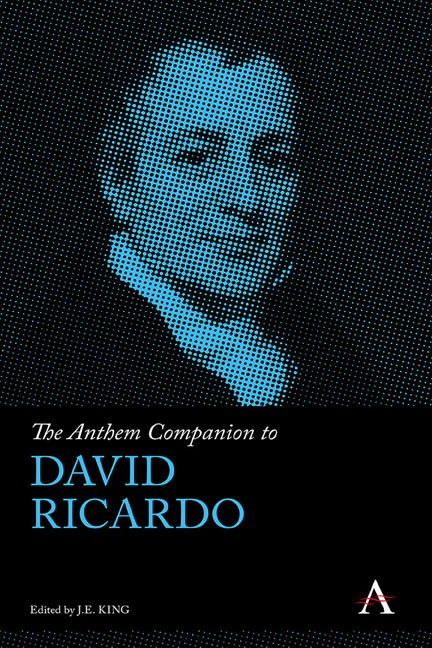Book contents
- Frontmatter
- Contents
- Notes on Contributors
- Chapter 1 Introduction
- Chapter 2 On Some Myths about Ricardo’s Theory of Money
- Chapter 3 Ricardo on Foreign Trade
- Chapter 4 ‘A Tolerably Correct Law Respecting Proportions’: Ricardo on Income Distribution
- Chapter 5 Ricardo on Economic Policy
- Chapter 6 (Mis)Interpreting Ricardo
- Chapter 7 Ricardo’s Business Activities
- Chapter 8 Political Economy ‘Through a Glass Hive’? The Encounter of Ricardian Ideas with Nineteenth-Century Australia
- Chapter 9 Ricardo and Classical Political Economy
- Chapter 10 Ricardo and Marx
- Chapter 11 Malthus and Ricardo on the Dismal Science
- Further Reading
- Index
Chapter 4 - ‘A Tolerably Correct Law Respecting Proportions’: Ricardo on Income Distribution
Published online by Cambridge University Press: 17 October 2023
- Frontmatter
- Contents
- Notes on Contributors
- Chapter 1 Introduction
- Chapter 2 On Some Myths about Ricardo’s Theory of Money
- Chapter 3 Ricardo on Foreign Trade
- Chapter 4 ‘A Tolerably Correct Law Respecting Proportions’: Ricardo on Income Distribution
- Chapter 5 Ricardo on Economic Policy
- Chapter 6 (Mis)Interpreting Ricardo
- Chapter 7 Ricardo’s Business Activities
- Chapter 8 Political Economy ‘Through a Glass Hive’? The Encounter of Ricardian Ideas with Nineteenth-Century Australia
- Chapter 9 Ricardo and Classical Political Economy
- Chapter 10 Ricardo and Marx
- Chapter 11 Malthus and Ricardo on the Dismal Science
- Further Reading
- Index
Summary
Introduction
It seems apposite, even if rather conventional, to open this essay by quoting Ricardo's famous statement in the Preface of his Principles:
The produce of the earth – all that is derived from its surface by the united application of labour, machinery, and capital, is divided among the three classes of the community; namely, the proprietor of the land, the owner of the stock or capital necessary for its cultivation, and the labourers by whose industry it is cultivated. But in different stages of society, the proportions of the whole produce of the earth which will be allotted to each of these classes, under the names of rent, profits, and wages, will be essentially different; depending mainly on the actual fertility of the soil, on the accumulation of capital and population, and on the skill, ingenuity, and instruments employed in agriculture. To determine the laws which regulate this distribution, is the principal problem in Political Economy. (Ricardo, 1951–73, I: 5)
Ricardo's statement elicits three – perhaps more unconventional – remarks. Firstly, it must be noted that it implied a significant change, in relation to the foundational definition proposed by Adam Smith, with regard to what is seen as the ‘principal problem’ or the ‘true objects’ of the science of Political Economy. Ricardo motivated this shift, away from the production of wealth to its distribution, not only by the unsatisfactory treatment of this problem by his precursor (I: 5), but also, and more importantly, by referring to the theoretical difficulties involved in ascertaining the absolute size of the social product and its development over time (in a letter to Malthus of 9 October 1820):
Political Economy you think is an enquiry into the nature and causes of wealth – I think it should be called an enquiry into the laws which determine the division of the produce of industry amongst the classes who concur in its formation. No law can be laid down respecting the quantity, but a tolerably correct one can be laid down respecting proportions. Every day I am more satisfied that the former enquiry is vain and the latter only the true objects of the science. (VIII: 278–79)
A second remark concerns the fact that Ricardo's focus on income shares or ‘proportions’ gave rise to a novel wage concept that he first presented in the Principles: the notion of the ‘real value of wages’.
- Type
- Chapter
- Information
- The Anthem Companion to David Ricardo , pp. 51 - 72Publisher: Anthem PressPrint publication year: 2023



